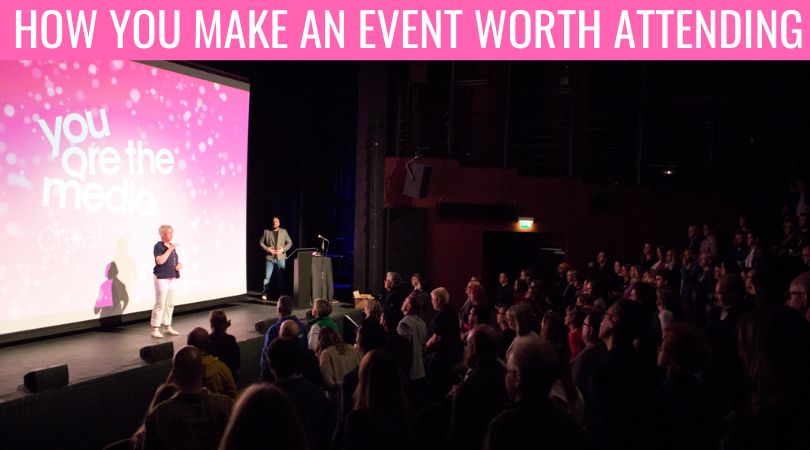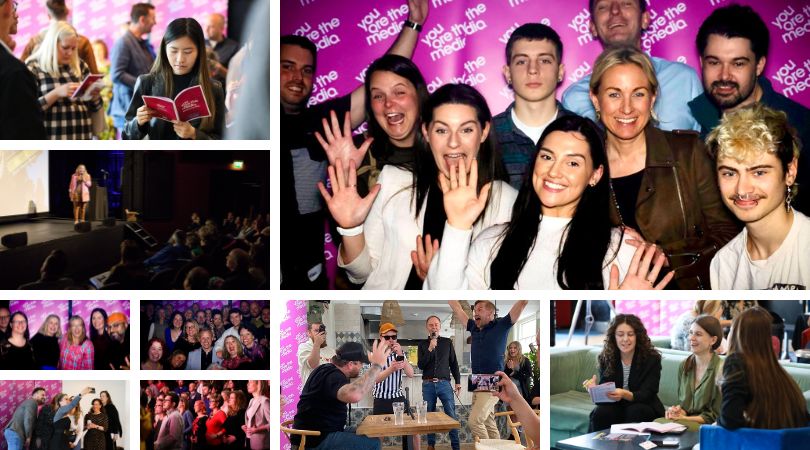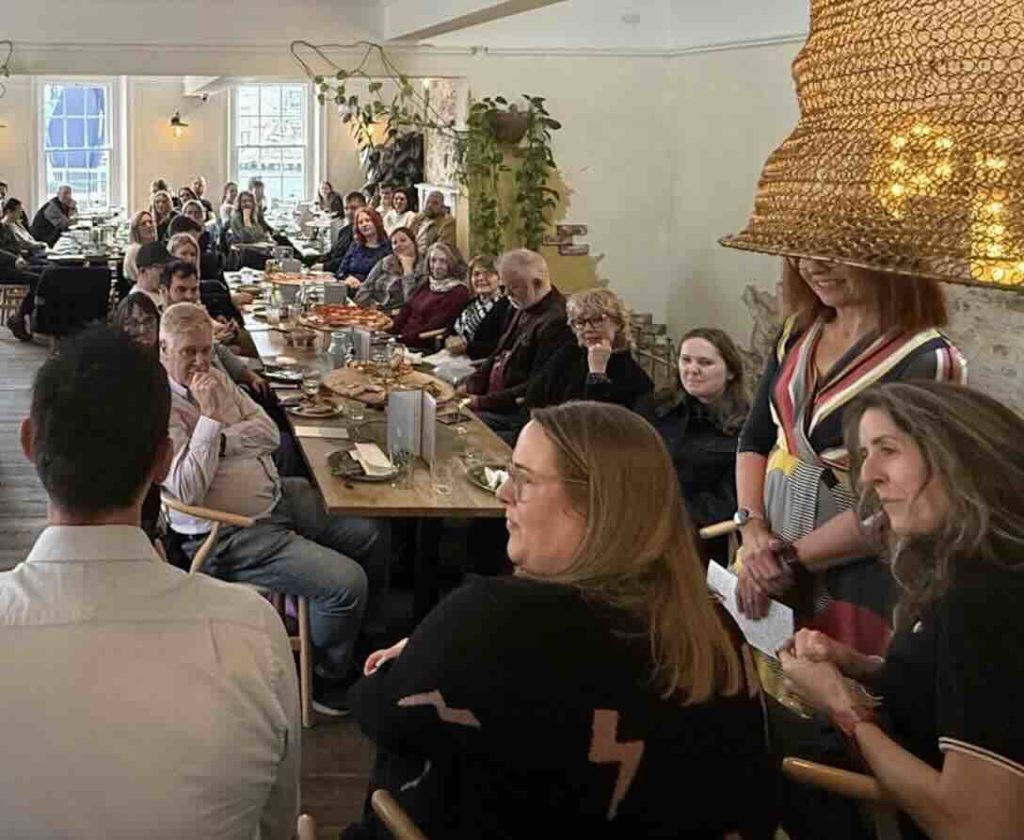Let’s learn and create together!
Book your placeHow To Make An Event Worth Attending

An event is worth attending when the focus is on the relationships built, not delivering what people have seen time and time again.
Communal spirit beats repetitive information.
We may think that people step up and buy our services, but it’s the connections and the environment that people feel a part of. The hardest part when it comes to putting on an event isn’t convincing people you don’t know, to attend, it’s giving the people who already trust you, every reason to tell others.
An event, at its core, is a gathering of people. It can be one of the most challenging projects you decide to step up and deliver. It is the ultimate form of social proof, when it works, you want to keep going.
This article is here to help you if you are thinking of stepping forward with your own event, or perhaps you have been delivering and not getting the return you wanted.
Fostering a sense of community is what determines longevity.
Reflecting On Recent Events
A recent event I presented at was the last event in its current guise. The organiser made the tough decision to pause their sessions for the time being.
I felt sorry for them as recognise that anyone who puts on an event does so by believing that what they do is right and worthy of people’s time.
The effort to encourage attendance was becoming arduous. With extensive outreach, emailing people and promotional posts, the time spent was outweighing the investment to put on the event. Plus, whilst we hope people commit, a lot of the time, the decision to attend happens when the event is imminent.
Hosting any form of event demands visibility; people must show up, whether it’s in a physical venue or a virtual space.
The pivotal question remains: What makes an event truly worth attending?
Reasons To Attend And Stay Away
We ran a poll in 2022 where we asked people ‘what stops you from attending an event?’ The biggest decision was time. We are all faced with so many distractions and commitments, that it’s not the cost but the time we commit.
Making that decision has to be right. People are weighing up far more today before they step forward.
However, when it comes to the decision to attend, there is a combination of factors around learning, meeting and support.
Mo Humphries is a business consultant and says, “For me, it’s a combination of things – to broaden my knowledge, hone my skills, broaden my networks and connect with people.”
“I don’t set my expectations too high, just one win. I always think when attending an event it’s been successful if I’ve learned one thing, or met one person, had one great conversation or if I’ve had fun being in the mix.”
Jon Jenkins, is an accountant and recognises his priorities. “Relational energy and care for the overall event matters. Relational energy is the positive feeling and sense of increased resourcefulness experienced as a direct result of an interaction with someone else.”
“I also look at what can I bring to the table? Am I going to be able to offer any pearls of wisdom that will help others learn from the experience? Can I give something of value back to the event.”
Course expert, Glen Long, shares the value of being invigorated. “Much of my work is from home so I enjoy the buzz of the occasional live event, particularly if I know I’ll see online colleagues/friends there. The learning element is important but I think I place more value on being inspired.”
With Mo, Glen and Jon’s help, it highlights the importance of designing the whole experience around the right people to join in and not necessarily everyone.
Here are some common pitfalls that can deter attendance.
Topic Relevance. An event has to be interesting, when it’s too broad, you lose people. For instance, if a topic is ‘business’ it has limited relevance. The more specific and tailored an event is, the more attractive it becomes.
Playing Safe. Replicating familiar formats might provide a sense of security, but it hinders innovation and lets new ideas take shape. Events need to be dynamic and offer fresh perspectives, it doesn’t always have to be led by networking.
No link to a wider cause/initiative. This is when an event sits in isolation and is not part of a wider effort. The breadcrumbs that should guide attendees are often missing. For instance, a newsletter allows ongoing communication and events bring the audience together.
Cost-effectiveness. Whilst the premium is the potential connections made, if it’s just presentations and no means to further learning, working, or encouragement it’s just an event dictated to you. We all become the transaction.
Marketing imbalance. Whether it’s relentless LinkedIn posts or email bursts, finding the right balance is crucial. Building an independent audience and reaching out to the right people rather than aiming for mass appeal is a more sustainable strategy.
Where It Can Work For You

When you step up it’s your role to guide and connect people, not become the person to process the attendees where you are out of sight. It can become the pillar where loyalty happens and fun bursts out.
This is where you can take the initiative and create a space where people come back for more. What I am sharing is based on delivering live events since 2016 and the importance of bringing people together.
Take these ideas on board, this works from experience.
Build Trust Early:
Regular communication before the “book now” stage is crucial. A weekly newsletter or regular updates help maintain contact and build anticipation.
If you can build trust and familiarity, it becomes easier when you approach people with an ask. What has helped me over the years has been the weekly YATM newsletter. It’s my way to keep in contact and to let people know that I am here. If you can be a part of someone’s routine, you are in a better place for someone to commit. You give before you ask.
Get To Know, Before You Ask:
Cultivate connections before making requests. A network built over months is far more likely to respond positively.
When you show up, enthused with your ask and there is familiarity, it helps. If there is that right fit and you know what you have lined up is suited, then it feels comfortable to suggest. There is value in attending. When people step up with no prior audience-building approach, this is where the problems happen. Build a following of people, not just followers.
Tease Topics:
Offering insights into themes before the actual event helps.
If you have an event that is covering specific topics, show your hand before the event. I have found that writing about a topic has helped me shape how I think about the subject matter and become a part of the event. This is then used to promote where you are leading on the insight and views and not the event itself.
Find Your Allies:
Finding support enhances your whole efforts.
Even if you pay for ads, you need as much help as you can. Your allies are out there. Find the people who are prepared to stand with you. We sometimes forget the power of people around us.
Direct Outreach:
Personalised messages, whether through a DM, a voice message or video messages, let people know it’s you.
If people are familiar with you and they subscribe, let them know their attendance would mean a lot. When they can see you are addressing them and it’s you having that one-to-one (and not part of a batched email send) it makes the whole approach feel personal. This is where you cherry-pick the people you want to attend.
Clarity In Everything:
Clearly communicating the event format, schedule, and takeaways helps potential attendees feel more at ease.
You want to help people progress with new ideas, connection, inspiration, and momentum. This has to be clear from the outset and make it clear what they are going to walk into and what they will leave with. Helping people make that association with the subject matter, their needs and their involvement supports the decision.
Embrace Risks:
A willingness to deviate from the norm can set your event apart.
Be brave in looking to take what has already been delivered by others but put your own stamp on it. It could be changing formats or it could be welcoming more Q&A than just presentations. The YATM Creator Day was born out of realising the importance of bringing people together and getting them to work and be accountable to each other. Look outside of your industry for inspiration.
Quality Over Quantity, All The Time:
Prioritise relationships over sheer numbers. It’s about reaching the right people.
We can reach for quantity by living our lives online and inviting the world to us. What is even more scarce today is getting the right people to come to the right place, at the right time, for the right reason. This is why your event can deliver. It pays to have good relationships.

This is how I have approached everything over the years to get people to attend. It follows this mantra:
Be specific
Be focused
Be relevant
Be compelling
Be interesting
Build your own audience
Build value-driven relationships
Bring the value to people before you ask

Community Is The Biggest Contributor
When you step forward to deliver an event, you are providing attendees what they sought when they signed up.
Your ability to make an engaging learning experience, easy networking and a sense of belonging to a community that supports each other.
You want to make something where people would miss you if you didn’t deliver.
The ultimate reason you put on an event, is the return and good feeling you can take from it but also to focus on relationship building. When you make that space where people socialise around a common interest, it can become one of the most rewarding projects you ever deliver.
For an event to progress, community is its heartbeat. It’s the work you do beforehand that makes it easy for the right people to say, ‘I’m coming’ and that feels good.
Let’s Round-Up
A successful event relies on your ability to curate a shared experience where people feel like they belong.
Starting out can feel daunting, as you realise there can be a lot of time involved from selling to scheduling. However, over time, you build a space that you are responsible for which people become a part of. If it’s something you believe in, your drive makes it work.
Events represent the places that bind us together.
Now, more than ever, creating an event is not just a gathering; it’s a place of positivity, a space where bonds are forged, and ideas shared and a place where people know they feel a part of.
Come and join in with us for YATM Creator Day on Thursday 25th April, in Poole. It works because of everything you read in this article.

Build Your Community
A brand new programme from Mark Masters for businesses wanting to make that next growth step.
Find out moreYATM Club
Where non-conformist business owners come to work, learn and make friends. Click here

